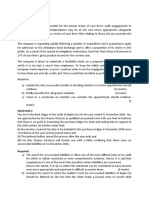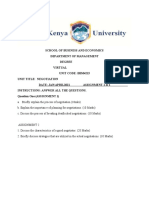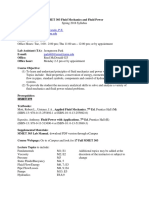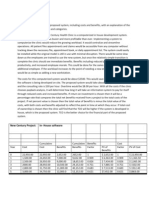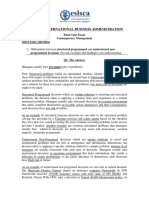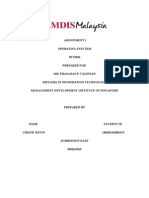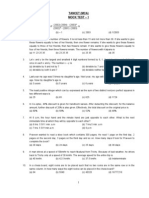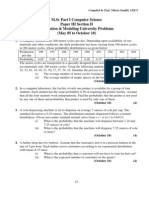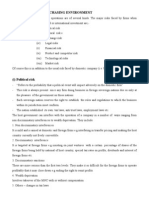Professional Documents
Culture Documents
Examination Questions
Uploaded by
Longman58201Original Description:
Copyright
Available Formats
Share this document
Did you find this document useful?
Is this content inappropriate?
Report this DocumentCopyright:
Available Formats
Examination Questions
Uploaded by
Longman58201Copyright:
Available Formats
3/2005
WHAT YOU SHOULD KNOW ABOUT EXAMINATIONS
EXAMINATION QUESTIONS WHERE DO THEY COME FROM?
SOURCE
The Job Analysis Detailed statement of work behaviors and other information related to the classification. A process that links tasks back to knowledge, skills and abilities SMEs review task lists and identify how critical they are to the job and if a candidate should possess them prior to appointment.
The Knowledge, Skills and Abilities (KSAs) Most exams test knowledge and abilities. Several KSAs can be tested in one question. Can be different than what is listed on the Class Specification. based on the Job Analysis Most, but not, are tested. Role of the Subject Matter Experts (SMEs) Compose job-related questions appropriate to the classification, not a specific vacancy. Establish the minimally acceptable responses for the questions. The role of the Exam Analyst Standardizes the question format Analyzes the questions for appropriateness and sensibility. Reviews and solidifies rating criteria for each question.
THE QUESTIONS
Tie to one or more KSAs
Are they measurable. Must distinguish between the best, good, marginal and poorly qualified candidates. Each question has rating criteria.
Can have more than one part. The first part could request knowledge from the candidate. The second part may ask the candidate how the knowledge is applied. Example: One of the hospitals needs a copy of a 10-page document by tomorrow afternoon. What methods could you use to honor their request? Which method is the most cost-effective?
Often are situational A situational questions may pose a hypothetical situations that may have occurred on the job. The competitor may be asked how they would handle the situation.
EXERCISE ON WRITING COMPREHENSIVE EXAM QUESTIONS
Questions must: Tie to a Knowledge or an Ability Be measurable Easy for a candidate to understand
You might also like
- Project Selection Exercise: ScenarioDocument6 pagesProject Selection Exercise: ScenarioMiguel VienesNo ratings yet
- Hacc423 Question Bank 2021Document13 pagesHacc423 Question Bank 2021Tawanda Tatenda HerbertNo ratings yet
- Competency Based RecruitmentDocument38 pagesCompetency Based RecruitmentfahimafridiNo ratings yet
- Question - Fa2020 - Midterm Exam - Fa2020 - CSE470 Courseware - Bux - BRAC UniversityDocument5 pagesQuestion - Fa2020 - Midterm Exam - Fa2020 - CSE470 Courseware - Bux - BRAC UniversitySadikul Alim TokiNo ratings yet
- Review The Ethiopian Procurement ProclamationDocument4 pagesReview The Ethiopian Procurement ProclamationAbraham100% (1)
- Model Select Quantitative Mid Exam November 2021Document3 pagesModel Select Quantitative Mid Exam November 2021yared gebrewoldNo ratings yet
- 1) Chapter OneDocument44 pages1) Chapter OneBekode YadesaNo ratings yet
- Bbm4215 NegotiationDocument1 pageBbm4215 NegotiationcyrusNo ratings yet
- Operation Management Lecture 3Document38 pagesOperation Management Lecture 3eslam hamdyNo ratings yet
- Kcse 2024 ComputerDocument9 pagesKcse 2024 ComputerhashimgulledNo ratings yet
- CH 4Document20 pagesCH 4Waheed Zafar100% (1)
- Kassahun AberaDocument56 pagesKassahun AberaNabeu MekereNo ratings yet
- BSC in Information TechnologyDocument10 pagesBSC in Information TechnologyDe HNo ratings yet
- MMET 303 Fluid Mechanics and Power SyllabusDocument5 pagesMMET 303 Fluid Mechanics and Power SyllabusJNo ratings yet
- Structured EnglishDocument2 pagesStructured EnglishKazz0% (1)
- Systems Analysis and Design 1224176203506505 9Document91 pagesSystems Analysis and Design 1224176203506505 9Ric TobiasNo ratings yet
- Accounting Exam 1Document4 pagesAccounting Exam 1Tra. SmNo ratings yet
- Cis 6000 - Bis Dissertation Project - Lecture 1 Writing - A - Research - ProporsalDocument72 pagesCis 6000 - Bis Dissertation Project - Lecture 1 Writing - A - Research - ProporsalKavindra TennakoonNo ratings yet
- All About Project PreparationDocument23 pagesAll About Project PreparationIsuu JobsNo ratings yet
- ISYSA Assignment QP Winter 2022 Winter 2023 20 Credit Paper FINALDocument7 pagesISYSA Assignment QP Winter 2022 Winter 2023 20 Credit Paper FINALMaryam ArshadNo ratings yet
- Advanced Financial Accounting IDocument3 pagesAdvanced Financial Accounting IMaryam umarNo ratings yet
- Assignment of AccountingDocument3 pagesAssignment of AccountingShanida AdzkiaNo ratings yet
- IEEE Code of Ethics For The Software Engineer EthicsDocument40 pagesIEEE Code of Ethics For The Software Engineer EthicsMaria ChNo ratings yet
- System Analysis and Design Assignment 4Document4 pagesSystem Analysis and Design Assignment 4Hummi KhanNo ratings yet
- MGT ACC1Document41 pagesMGT ACC1MsKhan00780% (3)
- Computer Application II Certificate NotesDocument102 pagesComputer Application II Certificate NotesJoy KananuNo ratings yet
- MU1 Practice ExamDocument22 pagesMU1 Practice ExamCGASTUFF100% (1)
- PSM Lecture Note - Draft 1Document34 pagesPSM Lecture Note - Draft 1Philcas Li100% (1)
- Exe DiagramsDocument6 pagesExe DiagramsPallavijoNo ratings yet
- The Effect of Management Information System On Achievement of Organization ObjectivesDocument27 pagesThe Effect of Management Information System On Achievement of Organization ObjectivesJared0% (1)
- Statistics July 2009 EngDocument7 pagesStatistics July 2009 EngPrasad C MNo ratings yet
- BPMS Project IT HelpDeskDocument16 pagesBPMS Project IT HelpDeskfanwellNo ratings yet
- Enterprise Data Integration For The Implementation of An E-Governance SystemDocument77 pagesEnterprise Data Integration For The Implementation of An E-Governance Systemajextope100% (1)
- Contemporary Management Final Exam AnswerDocument16 pagesContemporary Management Final Exam Answermohamed mostafaNo ratings yet
- Causes and Effects of Examination Malpractice in Secondary SchoolsDocument8 pagesCauses and Effects of Examination Malpractice in Secondary SchoolsAdiuku Kelechi WhitneyNo ratings yet
- BB 502Document4 pagesBB 502Sagar Guglani100% (1)
- Final Year Project: Proposal Cinetime Nepal - Android AppDocument14 pagesFinal Year Project: Proposal Cinetime Nepal - Android AppE TailNo ratings yet
- Ijsrp p4671 PDFDocument5 pagesIjsrp p4671 PDFsunil nemaNo ratings yet
- Assignment 1 OSDocument6 pagesAssignment 1 OSKevin CheowNo ratings yet
- CBS Case StudyDocument11 pagesCBS Case StudyManu GiriNo ratings yet
- Tancet (Mca) Mock Test - 1Document9 pagesTancet (Mca) Mock Test - 1Krishna KumarNo ratings yet
- Simulation ProblemsDocument14 pagesSimulation Problemsamitkulkarni87654No ratings yet
- CIA Practice QuestionsDocument11 pagesCIA Practice QuestionsAlex StoianNo ratings yet
- Question Bank Operations Management MGA 602Document6 pagesQuestion Bank Operations Management MGA 602Jennifer JosephNo ratings yet
- Literature Review For Wheel ChairDocument22 pagesLiterature Review For Wheel ChairShakil MalikNo ratings yet
- Principles of Accounts 11Document47 pagesPrinciples of Accounts 11Godfrey LwandoNo ratings yet
- 07 TutorialDocument4 pages07 Tutorialkrishna100% (1)
- Chapter Five and Six Answer PDFDocument3 pagesChapter Five and Six Answer PDFrhealyn ramadaNo ratings yet
- CV With Out ReferenceDocument3 pagesCV With Out ReferenceyohanneshibstuNo ratings yet
- Geda Jebel Final ThesisDocument93 pagesGeda Jebel Final ThesispurnawanNo ratings yet
- International Purchasing Environment Doc2Document5 pagesInternational Purchasing Environment Doc2Eric Kipkemoi33% (3)
- OOAD Assignment 1Document10 pagesOOAD Assignment 1Mohsin Mustufa60% (5)
- Solution Assignment 2Document15 pagesSolution Assignment 2Sania ShehzadNo ratings yet
- Attitude of Students Towards Usage of Social Media in Mizan Tepi University Tepi Campus StudentsDocument26 pagesAttitude of Students Towards Usage of Social Media in Mizan Tepi University Tepi Campus StudentsManamagna OjuluNo ratings yet
- IT3204: Software Engineering I: University of Colombo, Sri LankaDocument6 pagesIT3204: Software Engineering I: University of Colombo, Sri LankaAnganaNo ratings yet
- PGDMLM PapersDocument10 pagesPGDMLM PapersAakash Singh0% (1)
- Michael Eshete (Assessment of Project Quality Management Practice in Case of Awash, Dashen and United BankDocument55 pagesMichael Eshete (Assessment of Project Quality Management Practice in Case of Awash, Dashen and United Bankdagmawi konjitNo ratings yet
- PBI Tutorial 1109Document42 pagesPBI Tutorial 1109broNo ratings yet
- Behavioral Interviewing: Selecting Quality Employees For A Quality OrganizationDocument42 pagesBehavioral Interviewing: Selecting Quality Employees For A Quality OrganizationSara JenningsNo ratings yet
- Competency-Based Employee Selection MCDocument14 pagesCompetency-Based Employee Selection MCaurelianNo ratings yet

